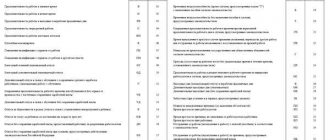The work schedules of state and private enterprises, despite the instructions of the Labor Code, are not constant. Employees of institutions and companies are periodically forced to work beyond normal limits if the employer insists on continuing work.
According to the Labor Code of the Russian Federation, overtime work is the labor activity of personnel approved by the management of the enterprise and carried out after the end of the eight-hour working day.
Further, in the article: ways to attract workers to additional work, payment and the legislative basis for overtime work.
What is included in overtime working time?
The work of a person working overtime involves performing the duties of the position held beyond the agreed time period.
The main condition in this case is the fact that in the content of the working agreement, daily professional activities must be limited to clear time frames throughout the week, or a shift schedule.
The thing is that for some categories of workers, irregular work hours can be established initially, for example, for a manager. For this, additional compensation is immediately established. In most cases, such compensation is provided in the form of additional days to the main break for rest and recovery. In this case, there is no question of working overtime.
Overtime work occurs if a person performed official duties in his personal time. Such a period is always specified in the content of the employment agreement and the internal rules of the company. A general non-working day does not always refer to personal time. For example, in the case of work that is performed on a shift basis, weekends do not always coincide with general holidays. At some enterprises that operate constantly, people can work on a general day off.
That is, in this case we are talking about working in personal time. For example, according to the terms of the agreement, the official daily finishing time for a person is eighteen hours. But for some reason a person was brought to work after the specified time, then it will be considered that he worked overtime.
It should be noted that if you work on your day off, such work is considered overtime only if it has not been paid or compensated in another way.
The main condition remains the fact that the activity time exceeded the established norm. This principle applies to situations where the accounting of hours worked is calculated cumulatively after the end of the accounting period.
How to get an employee to work overtime?
The Labor Code of the Russian Federation defines situations when a manager is required to obtain the consent of an employee in order to attract work, and when such consent is not required.
It is mandatory to obtain the worker’s consent in the following cases:
- The work started could not be completed due to technical or organizational reasons. But it is necessary to fulfill the planned volume, since any delay may result in the loss of the company’s material assets or harm to others.
- It is necessary to complete repair work on setting up instruments and other equipment, the full functioning of which determines the usefulness of the company’s activities as a whole.
- In case of no-show of the replacement specialist. This applies to going concern organizations. In this case, the manager is obliged to find a replacement for the person who failed to show up as soon as possible.
In these situations, the manager must coordinate his actions with the trade union body.
There is no need to obtain the worker’s consent to engage in work in the following circumstances:
- Preventing or eliminating the consequences of industrial accidents, man-made disasters or natural disasters.
- Elimination of reasons that create obstacles to the normal functioning of systems providing electricity, gas, water, as well as transport organizations and communication structures.
- Performing duties when caused by emergency circumstances - military operations, mass diseases, fires, hunger and other reasons that pose a threat to others.
Some categories of workers cannot be involved in this type of work, regardless of the reasons and the presence of consent. These include future mothers and those under eighteen years of age.
Women raising children under three years of age and working people with limited physical capabilities have advantages.
For such categories, obtaining consent on any matter is a prerequisite. Due to the state of their health, they must be able to carry out the instructions of the manager. At the same time, they must be informed of their opportunity to refuse work.
The duration of this work should not be more than four hours for two consecutive days. This time should not exceed one hundred and twenty hours per year.
It would be right for a manager to use well-founded, rather than far-fetched, reasons for attracting people to work. This approach will avoid problems in the future.
As practice shows, a fairly large number of lawsuits are caused precisely by unfounded reasons for being hired to work after the end of regular time.
Standard working hours per week according to law
According to the standards of the Labor Code of the Russian Federation, the daily standard of working hours should not exceed (Article 94 of the Labor Code of the Russian Federation):
- 4-6 hours - for minors working during vacations;
- 2-4 – for citizens receiving secondary or higher education and combining study with work;
- 8 hours with a 36-hour week for employees of enterprises with dangerous or harmful working conditions, with a 30-hour week – 6 hours;
- 12 – with a 36-hour week for employees of enterprises with moderate working conditions.
According to Article 97 of the law in question, overtime or overtime is the performance of work beyond the established schedule and norm. The initiator of processing is the management party.
Issues that reveal the principles of introducing processing are regulated by Article 99 of this code. According to the content of the article in question, in some cases an employee cannot be forced to perform overtime work against his will. The employee’s consent to overtime is recorded in writing and sealed with his personal signature.
The reasons for involving an employee in processing may be the following:
- If there is an urgent need to complete important work that was previously started but not completed for production reasons;
- During forced repairs of mechanisms and buildings, the failure of which may lead to a global suspension of the work process;
- In case of non-appearance of the replacement employee, if the work is continuous.
By law, the employer is authorized to oblige an employee to perform overtime work without his written consent if the employee’s participation is required:
- In operational actions to prevent a disaster and eliminate the danger of an emergency;
- In order to eliminate disruptions in the supply of heat energy, hot and cold water, natural gas;
- In cases of saving the lives of citizens under martial law or a state of emergency.
In all other cases, forced involvement of employees in processing is unacceptable . Assigning overtime work on any basis is not legal in relation to pregnant women and minor employees.
Like other Federal laws, the current Labor Code of the Russian Federation regularly undergoes necessary amendments. The latest changes to the provisions of this law regulating the nuances of processing were made on June 19, 2020. The amending document was the Federal Law “On Amendments to the Labor Code of the Russian Federation”.
The introduced amendments to the Labor Code of the Russian Federation determine the rules for recording overtime work and additional hours. At the same time, it is clarified that the payment for processing should be increased.
In addition, study 120 Federal Laws on the basics of the neglect prevention system as amended. All provisions of this law are aimed at protecting minors.
Check out the reasons for returning money for goods according to the law
Is working on weekends and holidays overtime?
According to the latest amendments introduced to the current Labor Code, work on weekends and holidays is no longer considered overtime. The main reason for this decision lies in the fact that payment for work on such days, according to the law, is already made at double the amount.
A citizen who had to go to work on a holiday or day off will be paid only for the time he worked on those days. Previously, in such cases, payment was provided for a full day of work, regardless of the actual time spent on overtime.
How is overtime paid according to the Labor Code?
Changes in the Labor Code of the Russian Federation made in the text of Article 152 of the law in question, processing is paid as follows:
- Minimum one and a half times higher than the standard daily rate - the first 2 hours;
- More than double the amount during other hours.
According to the regulations of the processing law in question, other amounts and terms of payments are established by the local corporate code or employment contract. At the request of the employee, monetary remuneration is replaced by the provision of time off equal to additional hours worked.
The provisions of Article 152 do not apply to employees involved in the preparations for the 2018 FIFA World Cup.
How many hours of overtime are you allowed to work?
According to the current law, the aggregate of overtime hours should not exceed 4 hours in a two-day period or 120 hours in a year.
It is the direct responsibility of the employer to maintain records of overtime for each employee.
Women with children under three years of age and disabled people are allowed to work only if they have a medical certificate of sufficient labor endurance. Representatives of these categories of citizens have the right to refuse to perform overtime work.
Can they refuse additional payment by law?
This law does not provide any real reasons on which an employer is authorized to refuse an employee additional payment for overtime work. Regardless of whether the overtime was carried out on the basis of the written consent of the employee or by order of the superiors, if the initiator is the employer, the refusal of additional payments is unlawful.
The employer’s categorical refusal to provide the payments in question serves as a direct basis for an application to the prosecutor’s office or labor inspectorate (
How to apply for overtime work?
The Labor Code has not established a clear procedure for implementing such a manager’s intention. According to established practice, it is necessary to perform a number of simple steps.
First of all, the person must be informed about the upcoming work outside the established time. It would be correct to issue such a notification in writing and hand it over to the worker against his signature. In the text, in addition to information about the sender and recipient, it is necessary to indicate the reasons and period of overtime work, as well as the type of compensation. It is also necessary to reflect the possibility of refusing assigned work, regardless of the category of worker.
It is worth noting that the current regulations do not require notification to be issued in writing, since there is not always time for this. For example, in case of emergency, you can inform a person orally.
The next step is to obtain the worker's consent in cases where this is required. Such consent may be issued in a separate document. Although this is not a requirement. In practice, most often consent can be reflected in the form of a personal signature on a notice or order of the manager, the execution of which is also mandatory.
The order must be in writing and delivered to the worker against signature. For the employee, it would be correct to agree with the manager on the type of compensation before directly drawing up the order. The thing is that a person does not always want to receive a monetary replacement. Some are asking for days to rest and recover. This should be specified initially, since after signing an order for labor compensation in cash, it will be impossible to get a day off, unless the manager agrees to cancel his order and issue a new one. But this happens extremely rarely.
It is worth noting that if rest time is provided, its duration should not be less than the period worked. There is no maximum limit to this time period. If a day off is granted, the person will receive pay as for a regular working day.
Labor Code of the Russian Federation
§ 1. The title of the article and its contents have been changed. Now this article regulates only overtime pay, since the rule on payment for work outside the normal working hours, performed part-time, is excluded from this article.
§ 2. Overtime is work performed by an employee at the initiative of the employer outside the established working hours of daily work (shift), as well as work in excess of the standard number of working hours for the accounting period.
Payment for overtime work according to the Labor Code of the Russian Federation
Art. 152 of the Labor Code of the Russian Federation establishes that payment for overtime hours has its own characteristics. First of all, this is influenced by the fact how long the overtime work actually lasted. The whole point is that the beginning and end of work of this nature will be paid in different amounts.
According to the established rules, the fee for the first two hours will be one and a half times the standard amount. Relatively speaking, if an hour of a specialist’s labor costs one hundred rubles, then he will be paid one hundred and fifty. Subsequent time will be paid at double the established amount.
The amounts indicated are the minimum limit. There are no maximum sizes specified. The current regulations made it possible to determine other amounts. This can be enshrined in the internal rules of the company or in the content of the employment agreement with the employee.
This rule applies to any type of labor, regardless of the way it is recorded.
The calculation of the amounts to be paid also follows general principles. The basis is the cost of labor per unit of time. In the case of setting salary for a position, the basis of calculation may be a day or a week.
Procedure for calculating payment for overtime work
In accordance with Article 152 of the Labor Code of the Russian Federation, the coefficients used in calculating compensation are established. The employer, on the basis of local regulations, has the right to increase the amount of remuneration. When paying for an unscheduled schedule, weekends and holidays are not taken into account.
Document flow
Compensation is issued on the basis of the employee’s written consent and an issued order. The head of an enterprise does not have the right to force an employee to perform job duties overtime. The procedure for involving a citizen in unscheduled work activities:
- Drawing up a notice on behalf of the director of the company about the assignment of overtime work.
- Drawing up a memo by an employee agreeing to perform job duties on an additional shift.
- Issuance of the corresponding order.
- Entering data into the time sheet.
To be recruited to work with his own approval, a citizen needs to draw up a memo based on a notice issued by the employer in the name of a subordinate. The written consent must indicate the purpose of calling the employee, the reason, date and time of the additional shift, and the type of compensation. Based on the documents received, an order is issued to assign overtime work. A citizen can begin his duties only after familiarizing himself with the paper. After unscheduled activities are carried out in the HR department, a time sheet is filled out for additional accruals at the end of the reporting period.
Payment calculation
Labor Code Article 152 regulates the calculation of monetary remuneration for overtime work. To determine the amount of unscheduled time spent on shift, the head of the organization must keep records of the duration of performance of official duties. Factors influencing payment calculation:
- working hours;
- monthly salary calculation system;
- number of unscheduled hours worked.
The schedule may involve a five-day work week or a shift with alternating days off. According to federal law, the normal work schedule involves performing job duties for 40 hours over 7 days. An organization may use a salary or hourly income accrual system. To establish the duration of excess time, days of vacation, unpaid rest, and time off for family reasons should be excluded. Only periods actually worked are taken into account. To calculate monetary remuneration, it is necessary to determine the employee’s hourly pay, taking into account the average monthly earnings for a five-day week:
- amount of profit / number of working days / shift duration;
- income / annual working hours in hours;
- salary / planned shift duration per month according to the production schedule.
Payment for overtime hours according to the Labor Code is made by multiplying the employee’s earnings for 60 minutes by a factor of one and a half or double, depending on the length of the irregular day. Unscheduled time in a five-day week is determined at the end of the month. The head of the enterprise independently sets the basic amount of earnings. By decision of the employer, payment for overtime may include a bonus and other compensation and benefits.
With a shift schedule, the calculation of monetary remuneration is carried out every quarter or half a year in connection with the establishment by the organization of a summary record of citizens’ time worked every 3-6 months. To determine hourly income, the amount of quarterly profit is divided by the number of working hours over 180 days. The amount of remuneration can be determined for the period actually worked during each shift or based on accounting results. The difference lies in the coefficient by which the profit is multiplied in 60 minutes.
Attention! The head of the organization independently decides whether to pay for overtime work in accordance with the Labor Code, taking into account the time spent performing job duties during a separate shift, or to summarize the hours for the quarter.
Piece workers' wages depend on the number of units produced. The accrual of overtime is influenced by the volume of work performed, taking into account its quality, complexity in a given period and the time of the unscheduled shift. To calculate, the amount for each manufactured part is multiplied by the number of products produced and one and a half or double indicator, determined by the duration of the irregular schedule. With an hourly wage system, the amount of compensation depends on the number of hours worked. The coefficient remains the same as when calculating remuneration for employees with a fixed salary. This method is used if the organization uses the summarized accounting method.







